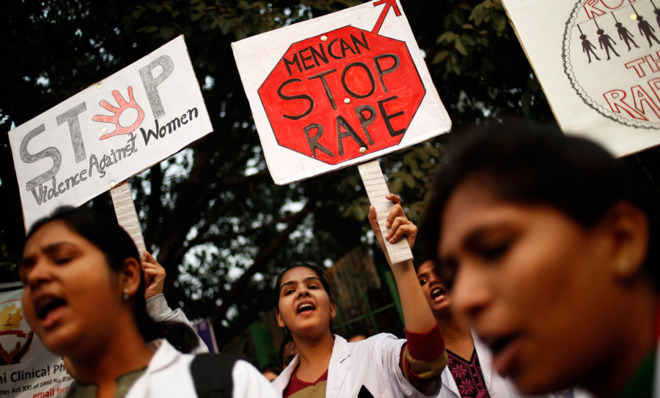India has a rape problem. But at least it's doing something about it.
It's time for the rest of South Asia to follow suit

A free daily email with the biggest news stories of the day – and the best features from TheWeek.com
You are now subscribed
Your newsletter sign-up was successful
The chances are good that the last time you read about India in the news, the story involved an accusation of rape.
Last week, a 20-year-old Indian woman made international headlines when she told police that the head of her village ordered her to be gang-raped as punishment for her plans to marry a man from outside the village. Earlier in January, a 51-year-old Danish tourist reported that she had been brutally gang-raped at knife point in New Delhi.
These sorts of stories have become all too commonplace. "India reels from another horrific gang rape case in wave of sexual violence," went a recent headline in The Guardian, which more or less sums up the way much of the Western media has covered this story since December 2012, when a 23-year-old woman was gang-raped on a bus in New Delhi and died 13 days later. India erupted in protest, turning the victim into a symbol of what The New York Times called "horrific cases of violence against women [that] seem to happen with disturbing regularity."
The Week
Escape your echo chamber. Get the facts behind the news, plus analysis from multiple perspectives.

Sign up for The Week's Free Newsletters
From our morning news briefing to a weekly Good News Newsletter, get the best of The Week delivered directly to your inbox.
From our morning news briefing to a weekly Good News Newsletter, get the best of The Week delivered directly to your inbox.
Indeed, rape is a notorious feature of village life, but the most recent string of high-profile rape cases in urban areas and tourist hot spots has elicited a domestic and international response of another order, with the Hindustan Times wondering if New Delhi has become a "rape capital."
While the epithet would seem to be merited, there’s one fact that often goes underreported: That India is far ahead of its regional peers when it comes to combating rape.
Indeed, public outrage has accelerated that change. An out-of-context glance at the statistics shows that reported rapes increased 30 percent since late 2012, but there’s a consensus that the spike stemmed from an increased faith in the legal system, rather than a bump in actual incidents of rape.
That newfound faith could be warranted. The December 2012 case was fast-tracked, and Indian news outlets started covering stories of rape on an almost daily basis. In September 2013, the four adult defendants were found guilty of rape, murder, unnatural offenses, and destruction of evidence.
A free daily email with the biggest news stories of the day – and the best features from TheWeek.com
In the case of the 20-year-old who was gang-raped last week, which allegedly occurred in rural West Bengal, the Indian Supreme Court ordered an investigation within 24 hours.
Furthermore, in the past year, sweeping new legislation was passed by the Congress Party-led Parliament that made stalking, voyeurism, and sexual harassment a crime; provided the death penalty for repeat offenders or cases in which a rape ended in the victim’s death; and barred police officers from refusing to open cases when complaints of sexual attacks are received.
The changes have been felt in the country's politics as well. State elections in December saw an unprecedented amount of dialogue about women’s issues. The Bharatiya Janata Party, the country's main opposition party, promised "safety and security to every daughter," and proposed a 10-point plan on how to achieve that end. The Aam Admi Party had a page dedicated specifically to women’s issues on its official website.
In other words, there's reason to hope that India is in the process of cracking down on sexual violence and changing a society where casual misogyny is widespread. But the same can’t be said for India’s neighbors. Nepal has about half the estimated number of rapes, but with a population that is 45 times smaller than India’s. In 2013, 10 percent of the men in Bangladesh admitted to having forced a woman to have sex, while 16 percent of the men in Sri Lanka admitted to it. And in Pakistan, there were 2,713 reported cases of violence against women in 2012 — and that’s in a country where sex is so stigmatized that some courts will only consider accusations of rape if there are witnesses.
There are signs that the outrage in India, which is a cultural leader in the region, is spilling over into neighboring countries, including Nepal, Pakistan, and Sri Lanka. But much, much more needs to be done, including a sustained degree of media attention that gives a voice not only to urban and foreign victims, but rural ones as well.
As one woman from New Delhi told CNN in the wake of the 2012 incident, "We're protesting here because she (the victim) could have been me." It's time to extend that sentiment to all South Asia's women.
-
 The environmental cost of GLP-1s
The environmental cost of GLP-1sThe explainer Producing the drugs is a dirty process
-
 Greenland’s capital becomes ground zero for the country’s diplomatic straits
Greenland’s capital becomes ground zero for the country’s diplomatic straitsIN THE SPOTLIGHT A flurry of new consular activity in Nuuk shows how important Greenland has become to Europeans’ anxiety about American imperialism
-
 ‘This is something that happens all too often’
‘This is something that happens all too often’Instant Opinion Opinion, comment and editorials of the day